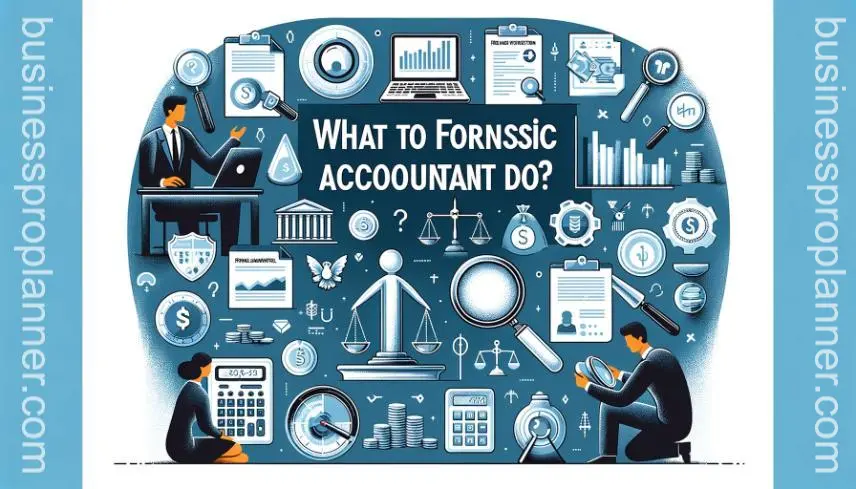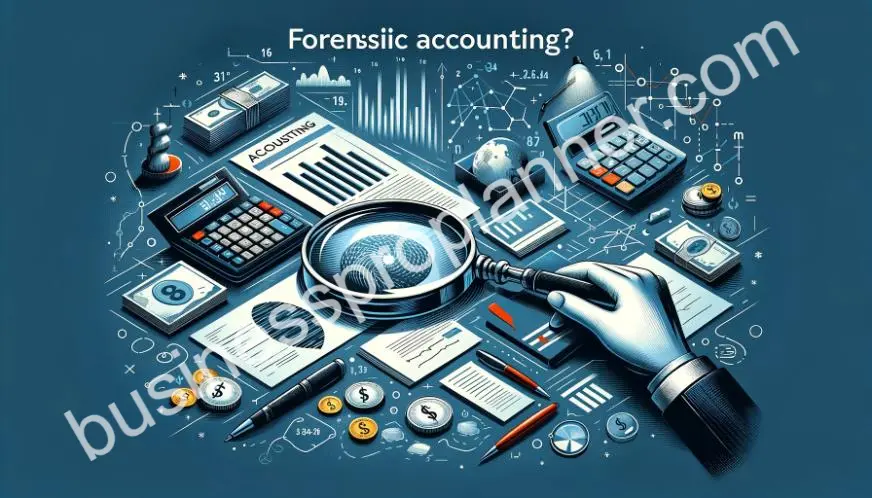Forensic accounting is a specialty practice area of accounting that describes engagements resulting from actual or anticipated disputes or litigation. Forensic accounting is a growing specialty area within the accounting profession. With rising instances of financial crimes like embezzlement, fraud, and litigation, the demand for forensic accountants has increased significantly over the past decade.
Forensic accountants leverage their accounting expertise and investigative skills to detect economic crimes, aid in legal matters, and assist in resolving complex financial disputes.
This blog post will provide a comprehensive overview of the field of forensic accounting, discussing key areas like what forensic accountants do, educational and certification requirements, career paths, work environments, and the promising job outlook within this specialty niche.
Key Takeaways
- Forensic accounting involves the application of accounting, auditing, and investigative skills to assist in legal matters.
- Forensic accountants help detect and investigate financial crimes like fraud and embezzlement.
- They are often involved in civil litigation cases where financial data and statements are under dispute.
- Forensic accountants utilize specialized auditing and investigative skills but also rely on a strong foundation in general accounting principles.
- Forensic accountants typically have a degree in accounting, auditing experience, and additional training in areas like fraud examination.
- Forensic accounting provides a career path for professionals looking to move beyond traditional auditing and accounting work.
- Demand for forensic accounting services continues to grow as businesses and government agencies seek ways to detect and prevent financial crimes.
What is Forensic Accounting?
Forensic accounting is the specialty practice area of accounting that describes engagements that result from actual or anticipated disputes or litigation. It is also referred to as investigative accounting or forensic auditing and utilizes accounting, auditing, and investigative skills to assist in legal matters involving financial disputes and losses from fraud or embezzlement.

Forensic accountants are typically hired to analyze, interpret, summarize, and present complex financial and business information in a manner that can be used in criminal and civil litigation cases. They are frequently involved in all aspects of litigation support, discovery proceedings, and investigative engagements where accounting and financial data need to be analyzed and financial crimes need to be detected and prevented.
What Do Forensic Accountants Do?
The unique role of forensic accountants combines finance and law. While their primary work involves interpreting figures and transactions related to legal conflicts and financial irregularities, forensic accountants often provide litigation support in a variety of legal disputes that have financial implications.
Some of the major activities forensic accountants engage in include:

- Detecting and investigating cases of fraud and embezzlement
- Analyzing financial statements and records for irregularities
- Reconstructing incomplete or destroyed accounting data and records
- Quantifying financial losses suffered by individuals and businesses
- Providing litigation support and expert testimony in court
- Tracing funds and assets to recover proceeds from financial crimes
- Investigating money laundering activities and organized crime
Forensic accountants utilize a combination of auditing, investigation, and accounting skills to uncover financial inconsistencies, illegal activities, and footprints of criminal financial behavior. Their findings and reports are often a crucial element of legal proceedings related to financial disputes and losses.
Professionals who practice forensic accounting come from diverse backgrounds but often begin their careers by obtaining a degree in accounting or a related field. They go on to gain professional certifications such as becoming a Certified Public Accountant (CPA) and obtain additional training and certifications in the field of forensic accounting and fraud examination. The Association of Certified Fraud Examiners (ACFE) offers a Certified Fraud Examiner (CFE) credential that is highly valued in this field.
Major Practice Areas of Forensic Accounting
While their core skills center on analyzing data and detecting financial misrepresentations and irregularities, forensic accountants work within several specialized domains requiring subject matter expertise. Some of the key practice areas include:
Fraud Investigations
Detecting, investigating, and documenting fraud is one of the major domains of forensic accounting. They are hired to examine allegations of fraud and financial statement manipulations in situations like:
- Employee fraud involving theft, embezzlement, kickbacks, etc.
- Management fraud results in misstated financials, overstated revenues, understated liabilities, etc.
- Investment scams, Ponzi schemes, pyramid schemes, etc. involving misappropriation of investor funds
- Vendor fraud through collusion, fake invoices, overbilling, etc.
- Tax fraud, concealment of income, etc.
- Cybercrime like phishing attacks resulting in theft and extortion of funds
- Money laundering through complex transactions and shell companies
Skilled forensic accountants utilize their financial expertise to trace fraudulent transactions, reconstruct records, and highlight anomalies that require additional legal investigation.
Business Valuation
Forensic accountants are frequently engaged to perform business valuations during transactions like:
- Mergers and Acquisitions – determining the fair value of target companies
- Bankruptcy Proceedings – assessing the value of the debtor’s estate and settlement of claims
- Civil litigation – loss calculations due to damages
- Marital Dissolution – equitable distribution of marital assets
They analyze company operations and forecast future cash flows to assess fair business value and testify regarding their valuation opinions in court.
Regulatory Investigations
Many government agencies like the Securities Exchange Commission (SEC) and Internal Revenue Service (IRS) engage forensic accountants during regulatory investigations into:
- Corporate Financial Reporting – to detect irregularities and accounting manipulations
- Tax Fraud – uncovering concealment of income and false deductions
- Securities Fraud – insider trading, market manipulation
- Non-compliance – violations of trade, environmental regulations, etc.
Forensic accountants support these investigations through analysis of financial statements, fund flows, lifestyle analysis of individuals, etc. to detect non-compliance and build a solid case.
Professional Associations
Forensic accountants often participate in professional groups and organizations to stay current on best practices, trends, and career opportunities. Some prominent associations include:
- Association of Certified Fraud Examiners (ACFE)
- American Institute of Certified Public Accountants (AICPA)
- Association of Certified Fraud Specialists (ACFS)
- American College of Forensic Examiners (ACFEI)
- National Association of Forensic Accountants (NAFA)
Membership in these groups provides access to training, certification, conferences, and peer networking to help forensic accountants continue honing their expertise.
Litigation Support
Forensic accountants provide litigation support and expert testimony during legal disputes over:
- Breach of contract – analyzing relevant accounting records and evidencing the breach
- Business loss claims – assisting in claim preparation and assessing the accuracy of claimed losses
- Business interruption claims – estimating losses suffered due to events like natural disasters
- Insurance claims – evaluating claims of damage/loss from accidents, catastrophes, etc.
Their expertise is useful in quantifying contested financial damages and bringing clarity to the complex financial aspects of a case.
How to Become a Forensic Accountant
Aspiring forensic accountants can prepare themselves by pursuing education and gaining experience in relevant areas. The key steps to start a forensic accounting career include:
Obtain a Bachelor’s Degree in Accounting
A strong foundation in accounting and auditing is vital for forensic accounting, so most forensic accountants obtain a Bachelor’s degree in accounting or finance. Coursework usually covers areas like:
- Financial Accounting
- Managerial Accounting
- Tax accounting
- Auditing standards
- Business law
Many also pursue Master’s degrees to gain more advanced accounting knowledge and skills. Programs like Master of Accounting (MAcc) and Master of Business Administration (MBA) with accounting specialization are preferred.
Become a Certified Public Accountant (CPA)
The CPA certification demonstrates core competency in accounting and auditing and is usually required to provide public accounting services. To become a CPA, students must:
- Complete 150 credit hours of education
- Pass the Uniform CPA Examination
- Meet work experience requirements
Earning the CPA demonstrates accounting proficiency and professional credibility which is valued in forensic accounting.
Obtain Forensic Accounting Education and Certifications
Specialized education and credentials in fraud examination and forensic accounting take one’s skills to the next level. Options include:
- Certificate programs in fraud examination and forensic accounting
- Master’s degrees like MSc in Economic Crime and Fraud Management
- Certified Fraud Examiner (CFE) credential from the ACFE
- Certification in Financial Forensics (CFF) from the American Institute of CPAs
Such education equips aspiring forensic accountants with financial investigation skills and demonstrates specialization to employers.
Gain Relevant Work Experience
Gaining on-the-job experience allows forensic accountants to apply classroom learning to real-world contexts. They can start by working in areas like:
- Auditing – Develop skills in evaluating internal controls, assessing financial statement integrity, and identifying irregularities. Entry-level experience as an auditor provides foundational skills that translate well into forensic accounting.
- Tax Accounting – Helps build expertise in detecting tax fraud and financial crimes involving concealment of income, false deductions, money laundering, etc. Experience in tax helps forensic accountants identify red flags.
- Investigation Units in Law Firms or Accounting Firms – Allows direct engagement in investigating fraud, building financial cases, and preparing evidence for trials. A valuable way to hone investigative skills under the guidance of experienced forensic professionals.
- Regulatory Agencies – Agencies like the SEC, IRS, and CFTC have dedicated enforcement and investigation divisions. Assisting in cases of financial fraud, tax evasion, and embezzlement builds first-hand experience.
- Law Enforcement – Agencies like the FBI and police have forensic accounting units. Working with law enforcement on criminal financial cases provides learning opportunities.
- Insurance Companies – Insurance fraud units utilize forensic accounting to detect inflated or fraudulent claims. Experience in this domain builds claims investigation skills.
- Banks – Lending departments use forensic accounting to minimize credit risk. Analyst roles in financial institutions provide relevant experience.
Gaining work experience across accounting, auditing, tax, investigation, and regulatory functions allows aspiring forensic accountants to identify the ideal career path before specializing. Hands-on experience also provides the professional credibility needed to become certified forensic accountants.

Career Outlook and Salary
The career outlook for forensic accountants is very strong as demand continues growing alongside increasing financial crimes and regulations. Employers like public accounting firms, corporations, government agencies, and law enforcement regularly hire forensic accounting professionals.
According to the U.S. Bureau of Labor Statistics, the employment of accountants and auditors is projected to grow 10% from 2020 to 2030, which is faster than average for all occupations.
The median annual salary for forensic accountants in 2023 was $84,860 according to Payscale. Those working in top accounting or law enforcement agencies may earn over $100,000 annually. Senior consultants and certified experts can command fees of $200 per hour or higher, with experience levels breaking down as follows:
- Less than 1 year experience: $66,000-$80,000
- 1-4 years experience: $70,000 – $90,000
- 5-9 years experience: $80,000 – $100,000
- 10-19 years experience: $90,000 – $120,000
- Over 20 years experience: $120,000+
Demand for forensic accounting services is rising as companies and government agencies enhance focus on risk management, fraud detection, and regulatory compliance. However, strong competition exists for these specialized accounting roles.
Conclusion
In closing, Forensic accounting offers an exciting career path that combines investigative skills with accounting knowledge. Forensic accountants take a lead role in detecting complex financial crimes and providing litigation support. Their unique expertise in unraveling financial statements and transactions makes them invaluable for both public and private sector organizations.
With rapid growth projected in the field, opportunities await those who pursue the education and certification needed to excel in this niche specialty. For those with a passion for numbers, tenacity for research, and talent for investigation, a career in forensic accounting promises intellectual challenges and high social impact.
Muhammad Asif Saeed has extensive experience in commerce and finance. Specifically, He holds a Bachelor of Commerce degree specializing in Accounts and Finance and an MBA focusing on Marketing. These qualifications underpin his understanding of business dynamics and financial strategies.
With an impressive 20-year career in Pakistan’s textile sector, including roles at Masood Textile (MTM) and Sadaqat Limited, excelling in business & financial management. His expertise in financial and business management is further evidenced by his authoritative articles on complex finance and business operation topics for various renowned websites including businessproplanner.com,businesprotips.com,distinctionbetween.com, trueqube.com, and bruitly.com, demonstrating his comprehensive knowledge and professional expertise in the field.

1 thought on “What Is Forensic Accounting? Understanding the Basics!”